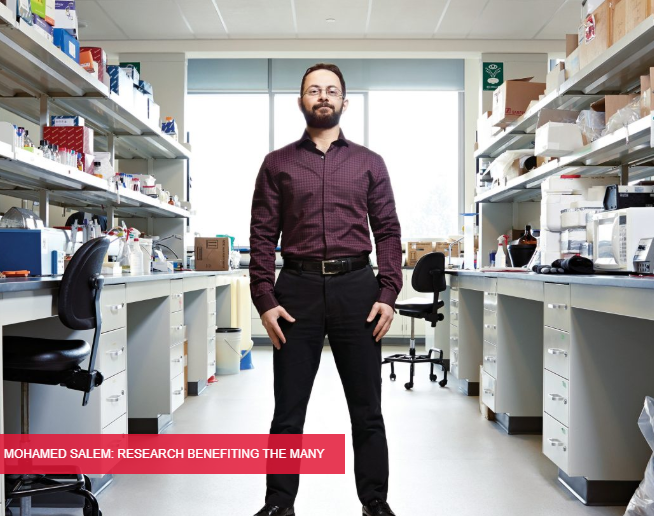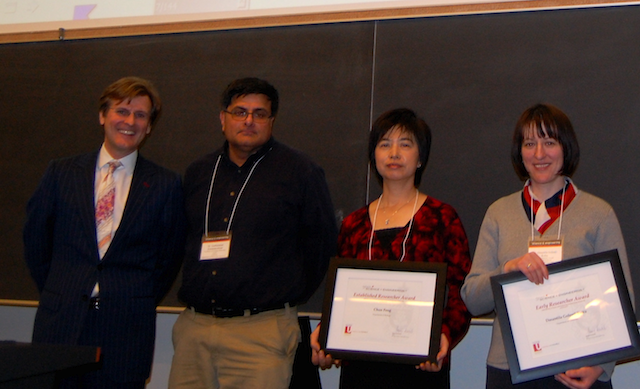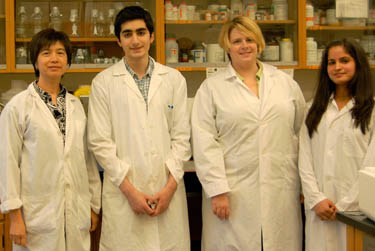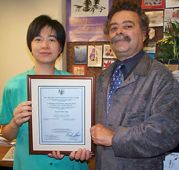Professor Peng receives $780,000 in CIHR funding
August 25, 2023
Professor and York University Research Chair Chun Peng received $780,000 from the Canadian Institutes of Health Research (CIHR) to fund a new project associated with her ongoing research into pre-eclampsia, a pregnancy disorder with a profound impact on maternal and fetal health.

The grant funds a project titled “NLRC5 isoforms in placental development and pathogenesis of pre-eclampsia,” part of Peng’s long-term research goal to better understand pre-eclampsia, which usually develops after 20 weeks of gestation and is characterized by high blood pressure, as well as damage to liver, kidneys or other organs. It is the leading direct cause of maternal and fetal death in the world, with over 75,000 pregnant women and 500,000 infants dying from it each year, according to the Centers for Disease Control and Prevention.
Even if someone survives the disease, it can lead to negative effects on the mother and fetus health during pregnancy, and can have lifelong negative impacts on cardiovascular health for both. The causes of pre-eclampsia are not fully understood, but it is known that abnormal placental development – in particular, the insufficient invasion of placental cells into the uterus to carry out the remodelling of the uterine blood vessels – is a major contributing factor.
The new study builds upon findings from a previous project where Peng and colleagues identified two truncated isoforms of a protein called NLRC5 in human placenta. Preliminary results suggest that these NLRC5 isoforms play important roles in regulating placental development, and they may contribute to the pathogenesis of pre-eclampsia. In this study, her lab will collaborate with researchers from Mount Sinai Hospital and Toronto General Hospital to further examine how NLRC5 exert their functions in the placenta and to determine if their over-expression will lead to the development of pre-eclampsia-like symptoms.
“This project will allow us to understand more of how placenta development is regulated during pregnancy and how the abnormal levels of NLRC5 isoforms may contribute to the development of pre-eclampsia,” says Peng. “We really hope that this can give us some clues on whether a new strategy could be developed to either prevent or treat pre-eclampsia.”
Peng, who had her York Research Chair in Women’s Reproductive Health renewed in 2021, has been conducting research to better understand pre-eclampsia since 1998, and has received several previous CIHR grants – collectively amounting to nearly $3.5 million – to study the disorder.
Three Faculty of Science researchers receive more than $2.27 million in CIHR grants
Posted on November 2, 2019 by yaraz
What is the link between obesity and heart failure? How can the most common and deadly form of ovarian cancer be stopped? How does the regulation of healthy cells under stress go wrong and cause diseases such as cancer and neurodegeneration?
These are the questions three Faculty of Science biology researchers, who recently received more than $2.27 million in Canadian Institutes for Health Research (CIHR) project grants, will tackle over the next five years.
Professor Chun Peng, along with co-applicants chemistry Professor Arturo Orellana, biology Professor Yi Sheng and chemistry Professor Derek Wilson, will develop ways to inhibit the growth and spread of the most common form of ovarian cancer, epithelial ovarian cancer (EOC), which could lead to targeted therapies for EOC patients. Professor Mark Bayfield will look at what goes wrong with the regulation process in healthy cells when they are under stress and how that can lead to cancer and neurodegeneration. Professor Gary Sweeney will try to figure out if excess fat is altering the structure and function of the heart, causing heart failure, and how.
“York is delighted to see professors Peng, Bayfield and Sweeney receive project grants from CIHR. To award these extremely competitive CIHR grants reflects a recognition of the excellence of York researchers in the biomedical and health research field,” said Interim Vice-President Research and Innovation Rui Wang. “These three projects are prime examples of how York researchers are focusing on improving health outcomes and bridging new knowledge and applications to improve the understanding, prevention and treatment of disease and injuries, and to provide healthier environments for individuals and communities.”
Peng’s project, “Development of novel ß-catenin inhibitors as potential therapeutics for ovarian cancer,” received a CIHR grant of $879,750.
Epithelial ovarian cancer – the most common form of ovarian cancer – has the highest mortality rate of female cancers. The low survival rate for women with EOC results mainly from an inability to detect the disease at an early, curable stage and from the lack of effective treatment for advanced cancer. The Wnt/ß-catenin pathway is known to play critical roles in cancer development, such as maintaining the cancer stem cells, promoting the spreading of cancer cells from the primary tumour into other organs and inhibiting the effectiveness of conventional chemotherapies. Peng and her team searched for novel inhibitors of this pathway and identified two compounds that have strong anti-tumour effects. The team will further characterize the effect of these inhibitors on cancer stem cells, tumour growth and metastasis, and see how these inhibitors disrupt ß-catenin signalling to exert their anti-tumour effects. They will also generate structurally similar compounds to identify molecules that have better drug-like properties. The research could lead to the development of novel targeted therapies for EOC. Since the Wnt/ß-catenin pathway is involved in the development of many types of cancers, the small molecular inhibitors Peng and her team develop will be useful for targeting a wide range of cancers.
Bayfield’s project, “Translational Control by the La and La-Related Proteins,” received a CIHR grant of $669,376.
Healthy cells have evolved several ways to respond to their environment and adapt to stresses. One critical way that cells respond to such cues is by controlling the cohort of proteins they synthesize, which allows the cell to adapt to new situations. However, dysregulation of these responses can lead to diseases like cancer and neurodegeneration. One class of factors known to have an important function in the control of protein synthesis is the La and La-related proteins. Dysregulation of function of the La and La-related proteins has been linked extensively to cancer and infection by viruses, but how this happens is not yet understood. In this proposal, Bayfield will identify the genes that rely on these factors, as well the ways in which they control protein synthesis. The research could lead to a substantial new understanding for many challenges to human health.
Sweeney’s project, “Investigating novel mechanisms of lipocalin-2 mediated cardiac dysfunction and their translational therapeutic potential,” received a CIHR project grant of $722,926.
Many reports have established a correlation between obesity and cardiovascular complications such as heart failure. A causative role of obesity, and the accompanying diabetes, is well known. Heart failure is a progressive problem, which occurs due to changes in the structure and function of the heart, yet the precise mechanisms responsible for regulating these changes in obesity remain to be determined. Given the escalation in the occurrence of obesity, it is imperative to focus on understanding the mechanisms linking excess fat tissue to alterations in the structure and function of the heart to help prevent heart failure and potentially enhance the understanding of how to protect against the progression of heart failure.
For more information, visit the CIHR Project Grant website.
Courtesy of YFile.




The Big O: New research allows for earlier detection of a silent killer
Posted on November 2, 2019 by yaraz
https://magazine.yorku.ca/issues/summer-2019/the-big-o/
FOR MANY women, late-stage ovarian cancer is usually an automatic death sentence. But new breakthrough research at York University may give hope to those afflicted by the deadly disease.By honing in on the body’s complex internal systems involved in the development of ovarian cancer, York Research Chair and Faculty of Science Professor Chun Peng and former grad student Mohamed Salem (PhD ’18) have uncovered the pivotal role played by a small tumour-promoting molecule in those patients with the disease.“Our study provides strong new evidence to support a tumour-promoting role of miR-590-3p in ovarian cancer,” says Peng, who supervised the research investigation that focused specifically on epithelial ovarian cancer (EOC), the most common and deadliest form of the illness. “We also identified a gene, FOXA2, as a target of miR-590-3p, providing several important lines of evidence to support the idea that FOXA2 inhibits tumour growth in ovarian cancer.” A microRNA, miR-590-3p naturally exists in our cells. However, its increased presence in the body may indicate that ovarian cancer has struck, explains Salem, who collaborated on the five-year study with researchers from York University, the University of Ottawa and the American University in Cairo.
Lowering that level can also help regulate the tumour progression and development, potentially resulting in a cure
Funded by the Canadian Institutes of Health Research and the Canada Foundation for Innovation/Ontario Research Fund, the findings were recently published in the peer-reviewed scientific journal Cancer Research.
Significant is the discovery that “miR-590-3p levels are higher in the blood of ovarian cancer patients when compared to women with benign gynecological disorders,” says Salem, adding that the level of this microRNA is higher in more aggressive tumour tissues compared to less aggressive ones.
“Measuring the level of miR-590-3p could potentially allow for early detection of the disease without the need for invasive procedures like surgery. Lowering that level can also help regulate the tumour progression and development, potentially resulting in a cure.”
While more work still needs to be done, the importance of this discovery cannot be underestimated.
Ovarian cancer is a leading killer of women with gynecological cancer in the developed world, having a five-year survival rate of just 44 per cent.
The mortality rate is high mainly because ovarian cancer is often hard to detect at an early stage. Symptoms generally are vague and elusive, and advanced screening tests tend to be inconclusive or non-existent. That’s why so many women continue to be afflicted.
An estimated 2,800 Canadian women will be diagnosed with ovarian cancer this year, and approximately 1,800 of them will die, according to the latest statistical data released by Ovarian Cancer Canada.
But despite ongoing research to find a cure, early detection and effective treatments at later stages of the disease remain the only means for a long-term remedy to ovarian cancer.
“The privilege of working in one of the York University labs, with cutting-edge advanced technology and a solid commitment and determination to make changes in people’s lives, lie at the core of our work,” Salem says. “The aim of our original research is to net results to benefit many.”


New research on ovarian cancer could mean improved patient outcomes
Posted on March 4, 2019 by jaobr
New research on ovarian cancer could mean improved patient outcomes – YFile
Highlights in American Society of Gene and Cell Therapy
Posted on September 27, 2018 by cpeng
The Vector | ASGCT – American Society of Gene & Cell Therapy | ASGCT – American Society of Gene & Ce
York research presents novel evidence on development of preeclampsia – YFile
Posted on September 27, 2018 by cpeng
York research presents novel evidence on development of preeclampsia – YFile
York professors awarded $2.7M in health research funding
Posted on October 23, 2017 by brkicj
Peng, in the Department of Biology, Faculty of Science, will receive $715,275 over five years to study “MicroRNA-218s and their regulated signaling networks in placental development and preeclampsia“.
Preeclampsia (PE) is a major disorder of human pregnancy, characterized by high blood pressure and presence of proteins in the urine. It is the leading cause of maternal death and still birth, and also affects the health of mothers and children later in their lives.
The cause of PE is not well understood; however, Peng’s research has discovered that microRNA-218 (niR-218) levels are lower in placentas of PE patients than those of healthy women, and that miR-218 regulates various activities in placental cells.
These novel findings suggest that miR-218 plays important roles in maintaining the proper development of the placenta and that insufficient production of miR-218 in the placenta contributes to the development of PE.
The major objectives of this grant are to further investigate the role of miR-218 in placenta development; to identify which key molecules are regulated by miR-218; and to determine how abnormal production of miR-218 may lead to PE.
Peng will use placental cells, placental organ culture and placenta/uterus co-culture systems, as well as endothelial cells, to study the functions of miR-218 and the key molecules regulated by miR-218. Findings from the proposed studies will improve the understanding of PE and may reveal novel diagnostic and therapeutic targets for this disorder
Click here for full article.
Award: Tier 1 York Research Chair in Women’s Reproductive Health (2016-2021)
Posted on February 8, 2017 by brkicj
Six emerging and established researchers newly appointed York Research Chairs
Six emerging and established researchers from across the University are newly appointed York Research Chairs. The appointments are part of a program established to build, support and intensify the world-renowned research underway at the University.
“I am delighted to announce the appointment of six new York Research Chairs and congratulate them on this significant accomplishment,” said Robert Haché, York’s vice-president research and innovation. “Recognized for their leadership in scholarship, research and creative activities, these Research Chairs reflect the spectrum of excellence in research & scholarship undertaken across the University.”
Tier 1 Chairs
Nantel Bergeron, professor in the Department of Mathematics and Statistics, Faculty of Science, was awarded a Tier 1 York Research Chair in Applied Algebra. Bergeron is one of the pioneers in the development of the theory of combinatorial Hopf algebras that serve as a conceptual laboratory in which researchers can understand and solve complex problems from other areas of science and mathematics. His research program will help to better understand the complexity of algorithms in computer science and mathematics and bring further insights into super-symmetry of nature.
Ellen Bialystok, Distinguished Research Professor in the Department of Psychology, Faculty of Health, has received a Tier 1 Walter Gordon York Research Chair in Lifespan Cognitive Development. Her research examines the effects of experience on cognitive function and brain organization across the lifespan, with a particular focus on bilingualism as an example of an intense and prevalent experience. The award will support studies of patients with early Alzheimer’s disease to provide a more complete description of these dynamic changes and develop a training protocol based on compensation that will improve cognitive function for all patients.
Chun Peng, professor in the Department of Biology, Faculty of Science, was awarded a Tier 1 York Research Chair in Women’s Reproductive Health. Peng’s long-term goal for her research program is to understand the regulation of female reproduction and the mechanisms underlying the development of ovarian cancer and preeclampsia. Her proposed research will enhance the overall understanding of female reproductive health and reveal novel biomarkers for preeclampsia and therapeutic targets for ovarian cancer.
Stepan Wood, professor at Osgoode Hall Law School, has been awarded a Tier 1 Chair in Environmental Justice and Sustainability. His research program explores transnational sustainability governance schemes across many issue areas from a transdisciplinary perspective. His research program seeks to harness these interactions to empower marginalized interests and advance sustainability.




Recent Awards and Grants – Chun Peng CIHR
Posted on December 1, 2011 by brkicj
Chun Peng (Biology) was successful in obtaining two CIHR operating grants for the following projects: 1) “cyclin G2 in ovarian cancer development” and 2) “Modulation of Nodal signaling pathway by microRNAs and their involvement in preeclampsia”.
Click here for original post.
Dr. Chun Peng receives the 2011 Chinese Canadian Legend Award
Posted on November 13, 2011 by brkicj
Chinese Canadian Legend recognizes and honours Chinese Canadians who have made significant contributions to the community and Canada through outstanding achievements in their field.

Professor Chun Peng leads research team uncovering how ovarian cancer resists chemotherapy
Posted on March 4, 2011 by brkicj
York University researchers have zeroed in on a genetic process that may allow ovarian cancer to resist chemotherapy. Researchers in the University’s Faculty of Science & Engineering studied a tiny strand of our genetic makeup known as a microRNA, involved in the regulation of gene expression. Cancer occurs when gene regulation goes haywire.
“Ovarian cancer is a very deadly disease because it’s hard to detect,” says biology Professor Chun Peng, who co-authored the study. By the time it’s diagnosed, usually it is in its late stages. And by that point there’s really no way to treat the disease. Even when the disease is discovered in its early stages, chemotherapy doesn’t always work,” she says.
Click here for full article.
Published in a variety of other sources:
Biocetera, NewsRX, BiomedME, The Free Library.com, aalaTimes, MedIndia, Rust-tele.
Honouring Research Excellence – The FSE Internal Research Awards
Posted on November 20, 2010 by brkicj
This year the Faculty of Science and Engineering presented researchers with Internal Research Awards to acknowledge the research achievements and dedication of various faculty members.
A world expert in the area of ovarian cancer and the molecular basis of complications in pregnancy, Professor Chun Peng from the Department of Biology is the recipient of the 2010 Established Researcher Award. Dr. Peng’s track record of awards and publications demonstrates the strong and superior research program and team that she has created at York University.
Click here for full article.

UNDERGRADUATE RESEARCH AT YORK THROUGH THE NSERC USRA PROGRAM 2009
Posted on January 12, 2010 by brkicj
Professor Chun Peng’s laboratory in the Biology Department has also been bursting with energy this summer as three NSERC USRA recipients have joined the group to pursue research projects in the area of cancer biology and fish reproduction.
Eilyad Honarparvar has been investigating an important protein called p27 that plays a protective role against cancer. Michele Taffs, joined the laboratory to investigate the role of certain chemicals in disrupting the reproductive system. Tanita Manchanda, will be exploring the role of miRNAs in placenta formation and eventually in cancer development and treatment.
Click here for the full article.

Women’s health researchers at York University win awards
Posted on January 30, 2006 by brkicj
The Ontario Women’s Health Council (OWHC) presented 27 awards on Jan. 20 during a ceremony at the Metro Toronto Convention Centre. Two professors and three graduate students from York University were among the award-winners.
Professor Chun Peng (left) of the Department of Biology, Faculty of Science and Engineering, received a Mid-Career Award for her research into the role of Nodal signaling pathways in ovarian cancer – among the deadliest cancers for women. PhD student, Guoxiong Xu, of the Department of Biology, a researcher in Peng’s lab, is also involved in work that may advance the scientific understanding of ovarian cancer. Xu received a Scholars Award for his research on the function and biological effects of a growth factor that may prevent the development of cancer cells.
Click here for full article.
Five unique research projects receive funding
Posted on March 16, 2005 by brkicj
Five groundbreaking York University research projects will receive more than $1.6 million in grants from the Canadian Institutes of Health Research (CIHR) over the next three to five years. Among the projects chosen for CIHR grants was Dr. Chun Peng’s Lab. Biology Professor Chun Peng, Faculty of Science & Engineering, will receive $227,304 over three years for cancer research. Peng’s research will examine the nodal signaling pathways in ovarian cancer cells.
Click here for full article.
Fertile Research
Posted on September 16, 2002 by brkicj
VP Research & Innovation Stan Shapson recently presented Chun Peng with a framed Premier’s Research Excellence Award certificate. The certificate was in recognition of her cutting-edge research in the areas of molecular endocrinology and female reproduction, especially regulation of ovarian and placental functions.
Click here for original article.

